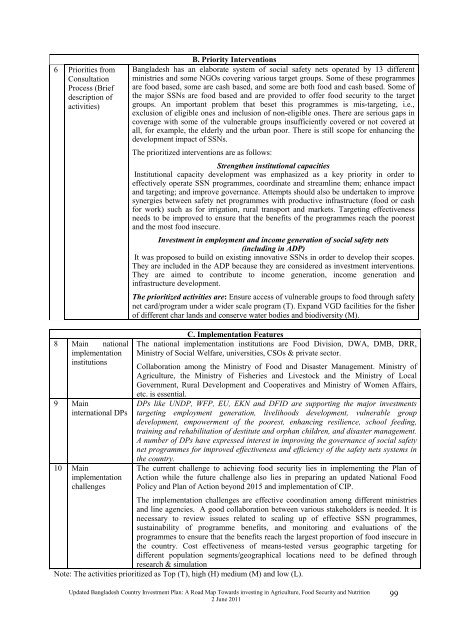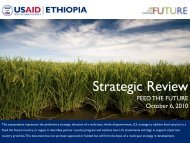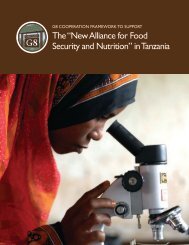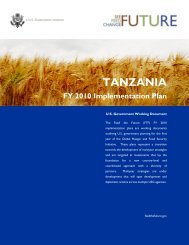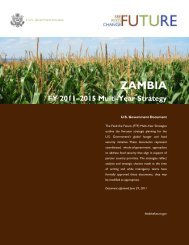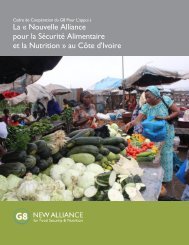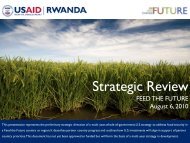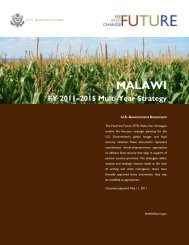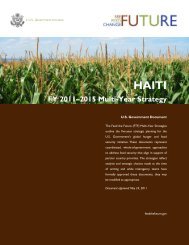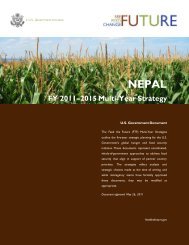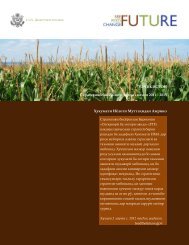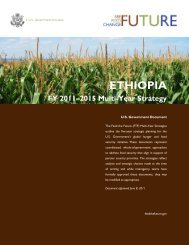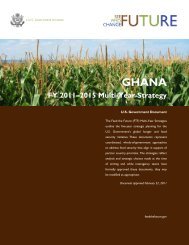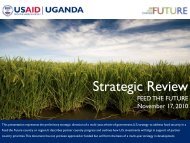Bangladesh Country Investment Plan - Feed the Future
Bangladesh Country Investment Plan - Feed the Future
Bangladesh Country Investment Plan - Feed the Future
Create successful ePaper yourself
Turn your PDF publications into a flip-book with our unique Google optimized e-Paper software.
6 Priorities from<br />
Consultation<br />
Process (Brief<br />
description of<br />
activities)<br />
B. Priority Interventions<br />
<strong>Bangladesh</strong> has an elaborate system of social safety nets operated by 13 different<br />
ministries and some NGOs covering various target groups. Some of <strong>the</strong>se programmes<br />
are food based, some are cash based, and some are both food and cash based. Some of<br />
<strong>the</strong> major SSNs are food based and are provided to offer food security to <strong>the</strong> target<br />
groups. An important problem that beset this programmes is mis-targeting, i.e.,<br />
exclusion of eligible ones and inclusion of non-eligible ones. There are serious gaps in<br />
coverage with some of <strong>the</strong> vulnerable groups insufficiently covered or not covered at<br />
all, for example, <strong>the</strong> elderly and <strong>the</strong> urban poor. There is still scope for enhancing <strong>the</strong><br />
development impact of SSNs.<br />
The prioritized interventions are as follows:<br />
Streng<strong>the</strong>n institutional capacities<br />
Institutional capacity development was emphasized as a key priority in order to<br />
effectively operate SSN programmes, coordinate and streamline <strong>the</strong>m; enhance impact<br />
and targeting; and improve governance. Attempts should also be undertaken to improve<br />
synergies between safety net programmes with productive infrastructure (food or cash<br />
for work) such as for irrigation, rural transport and markets. Targeting effectiveness<br />
needs to be improved to ensure that <strong>the</strong> benefits of <strong>the</strong> programmes reach <strong>the</strong> poorest<br />
and <strong>the</strong> most food insecure.<br />
<strong>Investment</strong> in employment and income generation of social safety nets<br />
(including in ADP)<br />
It was proposed to build on existing innovative SSNs in order to develop <strong>the</strong>ir scopes.<br />
They are included in <strong>the</strong> ADP because <strong>the</strong>y are considered as investment interventions.<br />
They are aimed to contribute to income generation, income generation and<br />
infrastructure development.<br />
The prioritized activities are: Ensure access of vulnerable groups to food through safety<br />
net card/program under a wider scale program (T). Expand VGD facilities for <strong>the</strong> fisher<br />
of different char lands and conserve water bodies and biodiversity (M).<br />
8 Main national<br />
implementation<br />
institutions<br />
9 Main<br />
international DPs<br />
10 Main<br />
implementation<br />
challenges<br />
C. Implementation Features<br />
The national implementation institutions are Food Division, DWA, DMB, DRR,<br />
Ministry of Social Welfare, universities, CSOs & private sector.<br />
Collaboration among <strong>the</strong> Ministry of Food and Disaster Management. Ministry of<br />
Agriculture, <strong>the</strong> Ministry of Fisheries and Livestock and <strong>the</strong> Ministry of Local<br />
Government, Rural Development and Cooperatives and Ministry of Women Affairs,<br />
etc. is essential.<br />
DPs like UNDP, WFP, EU, EKN and DFID are supporting <strong>the</strong> major investments<br />
targeting employment generation, livelihoods development, vulnerable group<br />
development, empowerment of <strong>the</strong> poorest, enhancing resilience, school feeding,<br />
training and rehabilitation of destitute and orphan children, and disaster management.<br />
A number of DPs have expressed interest in improving <strong>the</strong> governance of social safety<br />
net programmes for improved effectiveness and efficiency of <strong>the</strong> safety nets systems in<br />
<strong>the</strong> country.<br />
The current challenge to achieving food security lies in implementing <strong>the</strong> <strong>Plan</strong> of<br />
Action while <strong>the</strong> future challenge also lies in preparing an updated National Food<br />
Policy and <strong>Plan</strong> of Action beyond 2015 and implementation of CIP.<br />
The implementation challenges are effective coordination among different ministries<br />
and line agencies. A good collaboration between various stakeholders is needed. It is<br />
necessary to review issues related to scaling up of effective SSN programmes,<br />
sustainability of programme benefits, and monitoring and evaluations of <strong>the</strong><br />
programmes to ensure that <strong>the</strong> benefits reach <strong>the</strong> largest proportion of food insecure in<br />
<strong>the</strong> country. Cost effectiveness of means-tested versus geographic targeting for<br />
different population segments/geographical locations need to be defined through<br />
research & simulation<br />
Note: The activities prioritized as Top (T), high (H) medium (M) and low (L).<br />
Updated <strong>Bangladesh</strong> <strong>Country</strong> <strong>Investment</strong> <strong>Plan</strong>: A Road Map Towards investing in Agriculture, Food Security and Nutrition<br />
2 June 2011<br />
99


